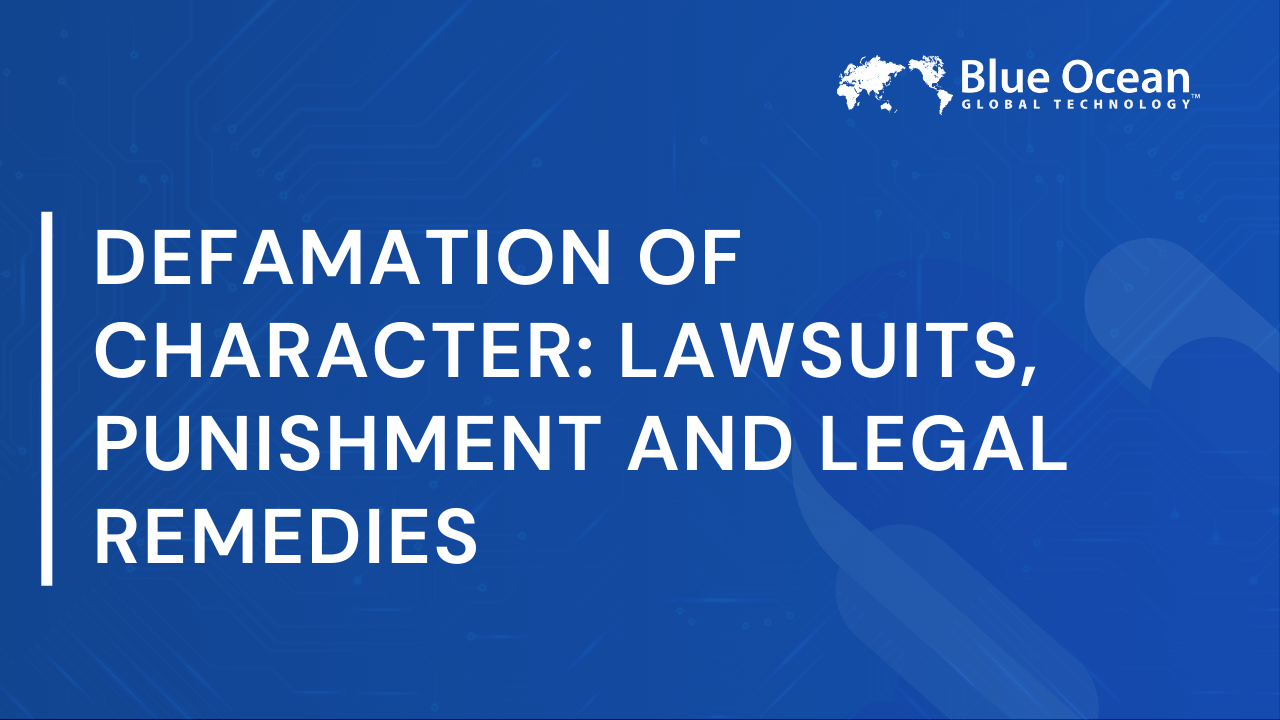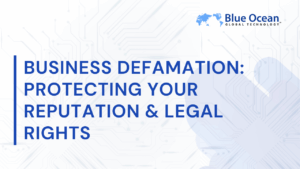Defamation of character refers to the communication of false information to a third party that results in reputational injury. The injured party can sue the injurer in a civil action lawsuit and claim compensation for the damage suffered.
Although criminal prosecution for defamation of character is rare in the United States of America (US), it is not an impossible occurrence. Some states still have criminal provisions to deal with defamation. People have, and can, go to jail for defamation of character.
A plaintiff can file a defamation lawsuit either for libel (defamation through writing/publication) or slander (defamation through spoken words). Further, they can specify whether they want to claim compensation for defamation per se or defamation per quod. Based on their claims, the courts will decide the award of damages, such as compensatory, special, general, or punitive. If the defamatory statement is too outrageous and induces unfathomable emotional distress, the plaintiff can also file an emotional distress lawsuit.
Parties involved in defamation disputes can either resolve the issues through negotiation or through a full-blown defamation trial.
What is Defamation of Character?
Defamation of character occurs when someone makes a false statement about a person with the intention of harming their reputation. The injurer presents the false statement as a fact before the third party and it results in reputational damage.
In the US, most states treat defamation of character as a civil wrong rather than a criminal offense.

What is Defamation of Character Lawsuit?
Defamation of character lawsuit, or defamation lawsuit, is a civil action. An injured party can bring this action against the person who knowingly makes false statements about them. With this lawsuit, the plaintiff can recover compensation for the reputational and/or financial injury they sustained.
Is Defamation of Character a Crime?
Although the majority of the US states view defamation of character as a tort, there are certain states that still have an operational criminal defamation statute. For example, Minnesota. In this state, it is a crime to knowingly make false statements that subject a person to hatred, contempt or ridicule. If convicted, an offender can face imprisonment up to 364 days, a fine up to $3,000 or both.
According to the International Press Institute’s 2015 report, there are 15 US states and union territories that still have criminal libel statutes. Some of the states where criminal defamation statute exists include Illinois, Texas, Virginia, Kansas, Massachusetts, and Florida.
Can You Go to Jail for Defamation of Character?
Yes, defamation of character can result in jail time if it occurs in a state where defamation is treated as a crime. For example, New Hampshire has a criminal defamation law. In this state, it is a crime to purposefully convey false information with the knowledge that it will expose a person to public hatred, contempt or ridicule.
In 2021, a man named Robert Frese wrote a comment in the comment section of a news site, accusing a local police chief of corruption. He was arrested and sent to jail for criminal defamation.
What are the two types of defamation claims?
There are two categories of defamation claims:
-
Libel:
defamatory statement communicated to a third party through written correspondence or publication. This also includes the publication of false statements on internet platforms.
-
Slander:
defamatory statement spoken to a third person. It also includes communication of false information through news shows and radio (as long as the statement is presented as fact and not as an opinion).
Defamation claim further bifurcates into two types:
-
Defamation Per Se
It is the form of defamation where the false statement is inherently defamatory. In other words, the statement is enough in itself to cause reputational harm. A defamation per se claim does not require the plaintiff to prove actual harm and the damages are presumed.
For example, suppose A lies to B that C went to jail for fraud. This statement is defamatory per se because the reputational damage is apparent.
-
Defamation Per Quod
This form of defamation requires the plaintiff to prove actual harm. In these cases, the defamatory statement is not inherently defamatory, but it becomes defamatory through external context and interpretation.
A claim for defamation per quod requires a plaintiff to prove that they experienced reputational and/or financial harm due to the false statement.
For example, A lies to B that C only hires men. This statement does not injure C’s reputation directly. However, if it is interpreted as meaning that C discriminates against women, it will damage C’s reputation as an employer. In this scenario, C will have to prove that the statement damaged their reputation.

How to Prove Defamation of Character
A plaintiff in a defamation of character lawsuit must establish the following before the court:
- Defendant’s statement is false.
- Defendant communicated the false statement to a third party.
- The statement was not privileged
- Communication of false statements resulted in reputational damage.
If the false statement is inherently defamatory and the plaintiff raises the claim of defamation per se, then they may not need to prove reputational damage. The court will presume that the damage is caused due to the nature of the statement.
However, if the plaintiff files a defamation suit for defamation per quod, they will have to show evidence of the claimed damages.
Further, if the plaintiff is a public figure, they will have to prove that the defendant acted with “actual malice”. As held in New York Times Co. v. Sullivan (1964), actual malice means that the defendant made the statement with knowledge of its falsity or with reckless disregard for the truth.

What Are Grounds for Defamation of Character?
If any person suffers the aftermath of a defamatory statement spread in their name, they can claim defamation damages on any of the following grounds:
- The statement is false and defamatory in nature.
- The false statement contained non-privileged information.
- Defendant communicated the false information to a third party with the intention to cause reputational harm.
- Defendant intended to incite emotional distress and mental anguish through the communication of false statements.
- Communication of the false statement caused financial damage.
- A false statement was communicated in a context that made it defamatory and ruined the reputation.
- Defendant posted false reviews on online rating platforms.
These are some of the grounds. Other grounds can emerge depending on the facts of the case.
Can You Sue for Defamation of Character?
Yes, you can sue for defamation of character if your case meets the legal criteria outlined above.
Can You Sue for Defamation of Character in Florida?
In Florida, individuals can sue for defamation of character if they can prove that the statement made was false and it caused them damage. Moreover, every plaintiff is bound by statute of limitation, whereby they have to file the suit within two years from the date on which the statement was made.
Additionally, defamation of character is also a crime in Florida. As per Florida Statutes, Section 836.01, libel is a first-degree misdemeanor. Moreover, under Section 836.04, it is a first-degree misdemeanor to falsely and maliciously accuse a woman of lacking chastity.
Strengthen Your Defamation Claim
Build a solid defamation claim with strong evidence and unshakable arguments. Your claim is safe in the hands of our specialized attorneys.
How to Sue for Defamation of Character?
The process to sue for defamation of character entails the following steps:
-
Hire an Attorney
Find an attorney specializing in defamation cases, who practices or has a license to practice in the jurisdiction where the suit is going to be filed. If you are not aware of the jurisdiction, you can consult an attorney first and then take a call on whom to hire.
-
Send a Legal Letter
Your attorney will begin the procedure of filing the lawsuit by sending a cease-and-desist letter to the defendant. This letter will demand the receiver to remove the defamatory content or take action to counter the defamation they caused.
-
File the Complaint
If the defendant fails to fulfil the demand, then your attorney will file a complaint with the court having jurisdiction over the matter.
-
Discovery
You will collect evidence and send them to the defendant and vice versa. At this stage, both parties will exchange the material they have to substantiate their claim.
-
Negotiation for Settlement
The defendant might try to settle outside of court. In other words, they might offer you compensation for damage or agree to issue an apology without going to trial.
-
Trial Begins
After alternative dispute resolution methods fail, you can proceed with a formal trial where a judge and jury will decide on your cause of action.

How to Sue for Defamation of Character in Florida
A plaintiff pursuing the option to sue for defamation of character in Florida must ensure that they are within the 2-year limitation period. Besides the steps mentioned above, there are a few other aspects that plaintiffs can keep in mind:
-
Select the Proper Court:
The appropriate court will depend on territorial and pecuniary jurisdiction. In other words, whether the court has the power to impose punishment on the defendant (i.e., if they are a citizen of Florida, or if the statement was published in Florida etc.) and whether the court can entertain cases of the amount claimed in damages.
-
Review Florida Defamation Law:
There are certain statements that are perceived as defamatory in some states and non-defamatory in others. Check whether the statement in question fulfils Florida’s legal criteria.
How Much Can You Sue for Defamation of Character?
The damages that can be claimed as compensation for defamation of character depend on the facts of the case and the evidence present to substantiate the amount. Primarily, a plaintiff in defamation of character can claim following damages:
-
Economic Damages:
This refers to the financial harm caused due to the false statement. Its valuation can include loss of business, loss of potential business opportunities, loss of wages, etc.
-
Non-Economic Damages:
This relates to emotional or mental distress suffered by the plaintiff.
-
Punitive Damages:
In cases where the defamation resulted from the egregious conduct of the defendant, plaintiffs can claim punitive damages.

How Much Can I Claim for Defamation of Character?
The amount of damages that you can claim will depend on a valuation of the injuries you sustained due to the defamatory statement. The sum total of economic damages, non-economic damages and punitive damages will be the total amount that you can claim for defamation of character.
What Are Punishments for Defamation of Character?
Generally, defamation of character results in civil penalties. If the defendant is found guilty, the jury will impose compensatory, assumed and punitive (rare) damages on them and ask them to pay it to the plaintiff.
However, if the defendant is found guilty of criminal defamation in states like Florida, they may also face imprisonment and fine.
The quantum of civil penalties and criminal punishment will depend on the state’s law, the defendant’s intent and the severity of the false statement.
How to Deal with Defamation of Character
Defamation of character can create legal as well as reputational crisis. On the legal front, an injured party can sue the defendant. On the reputational front, it is advisable to opt for reputation management strategies.
Reputation Management
In cases of defamation of character, false and derogatory information about a person can spread like wildfire and affect their social standing and professional life. Therefore, it becomes crucial for them to opt for strategies that can counter or minimize the damage that flows from the communication of false statements, especially in the digital era.
Reputation Management refers to strategies that contain counter moves to offset the impact of defamation. It is a multifaceted approach that includes reputation repair, online monitoring of defamatory content, management of offsetting content to be posted, suppression of negative information available, etc.

Legal Remedies for Defamation of Character
An injured party can resolve the dispute regarding defamation of their character either through a lawsuit or an outside-court negotiation. Either way, they can demand monetary compensation for the damage suffered and/or public apology for communication of false statements.
In instances of defamation of character lawsuits, plaintiffs can claim:
-
Compensatory Damages:
These damages are awarded to offset the actual damage suffered.
-
Special Damages:
This usually arises in matters of defamation per quod. These damages are awarded with respect to calculated economic damage that resulted directly from the defamatory statement (for example, loss of business)
-
General Damages:
These are awarded from damage that cannot be quantified. For instance, public humiliation, emotional distress etc.
-
Punitive Damages:
In rare cases where the defendant’s conduct is egregious or extremely malicious, jury awards these damages to punish the act and deter its reoccurrence.

What is the Difference Between Slander and Defamation of Character?
Defamation of character is an umbrella term and is used for all forms of false statements that negatively impact a person’s reputation. On the other hand, slander is a specific type of defamation of character. It occurs when the defamatory statement is communicated to the third party verbally.
What is an Emotional Distress Lawsuit?
An emotional distress lawsuit can be filed to seek compensation for severe emotional harm caused by an offender’s action. This can be filed in instances where the offender’s actions are so outrageous that they go beyond all realms of decency and severely impact the plaintiff’s mental well-being.
In matters of defamation of character lawsuit, an emotional distress lawsuit can be filed along with the original claim.
What is An Example of an Emotional Distress Lawsuit?
Recently, renowned journalist Anas Anremeyaw Anas sued Kennedy Agyapong (Ghanian parliamentarian) because the latter accused the former of murdering another journalist. The lawsuit was filed in New Jersey (US).
The U.S. Court ruled in favor of Anas and held that he suffered emotional distress because “he had to field mortifying ordeal of facing questions from his family, friends, peers, and clients from all over the world”.

What is a Defamation Trial?
Defamation trial is a courtroom procedure where a plaintiff makes their claim for defamation, the defendant defends the claim, and the judge and jury determine the veracity of the claim. After an individual faces the consequences of a defamatory statement, they may file a formal complaint in appropriate court. Once filed, the court initiates the proceedings where plaintiff and defendant make arguments and present evidence in their favor to prove or disprove the claim of defamation.
Conclusion
Defamation of character is a civil wrong. It results from the communication of a false statement that causes reputational injury. An injured party can sue the offender and claim compensation for the injury through a lawsuit. Although most US states deem it as a tort, it is a first-degree misdemeanor in certain states, such as Florida.
There are two aspects of defamation: legal and reputational. While the injured party can resolve the legal aspect in court through a defamation trial, it might need external support for reputation management.
Blue Ocean Global Technology offers reputation management services that can counter the aftermath of defamation of character. Feel free to contact us today for further information.
Speak to a Defamation Attorney
Need help to strategize your defamation claim? Contact our legal team for a confidential consultation to explore legal remedies.












